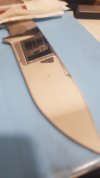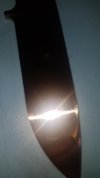-
The BladeForums.com 2024 Traditional Knife is available! Price is $250 ea (shipped within CONUS).
Order here: https://www.bladeforums.com/help/2024-traditional/
You are using an out of date browser. It may not display this or other websites correctly.
You should upgrade or use an alternative browser.
You should upgrade or use an alternative browser.
Best water alternative for diamond sheets
- Thread starter JoeBusic
- Start date
- Joined
- Jun 29, 2014
- Messages
- 450
I use a light solution of Simple Green when I do any wet hand sanding and it works great.
- Joined
- Jan 21, 2020
- Messages
- 557
What's Simple green? I'm in EU so I need an alternative.I use a light solution of Simple Green when I do any wet hand sanding and it works great.
- Joined
- Jan 21, 2020
- Messages
- 557
Hardened. N690@62HRC. Training for MagnaCut@65HRC.Are you using it on hardened blades or soft steel?
I ask because I experience clogging on steel pre HT, but not after with windex and diamond film.
- Joined
- Jan 21, 2020
- Messages
- 557
I asked ChatGPT:
For fine sanding with diamond sheets, you need a lubricant that won't clog the diamonds or be too thick. Here are a few alternatives you can consider:
1. **Isopropyl Alcohol (IPA)**: Isopropyl alcohol is a common choice because it evaporates quickly, leaving no residue. It's thin enough to not clog the diamond sheets and can effectively carry away debris.
2. **Mineral Spirits**: These are less viscous than oil and can provide good lubrication without clogging the diamond sheets. They also evaporate slower than alcohol, giving you more working time.
3. **Dish Soap and Water Solution**: A diluted dish soap solution can reduce the surface tension of the water, helping to prevent clogging. Mix a small amount of dish soap with water (e.g., a few drops of dish soap per cup of water).
4. **Kerosene**: This can be used as a lubricant for fine sanding. It's thinner than oil and won't clog the diamonds, but ensure proper ventilation as it has strong fumes.
5. **Windex with Ammonia**: Regular glass cleaner clogs the diamonds, but one with ammonia might be more effective at preventing buildup. However, always test it on a small area first to ensure compatibility with your materials.
6. **Coolant Fluids**: Some specialized coolant fluids designed for machining or grinding can be used. These are formulated to keep the workpiece cool and provide good lubrication without clogging abrasive tools.
When using any alternative, always ensure proper ventilation and safety precautions. Test the lubricant on a small area first to confirm it works well with your diamond sheets and the material you are sanding.
Dish soap sounds available...
For fine sanding with diamond sheets, you need a lubricant that won't clog the diamonds or be too thick. Here are a few alternatives you can consider:
1. **Isopropyl Alcohol (IPA)**: Isopropyl alcohol is a common choice because it evaporates quickly, leaving no residue. It's thin enough to not clog the diamond sheets and can effectively carry away debris.
2. **Mineral Spirits**: These are less viscous than oil and can provide good lubrication without clogging the diamond sheets. They also evaporate slower than alcohol, giving you more working time.
3. **Dish Soap and Water Solution**: A diluted dish soap solution can reduce the surface tension of the water, helping to prevent clogging. Mix a small amount of dish soap with water (e.g., a few drops of dish soap per cup of water).
4. **Kerosene**: This can be used as a lubricant for fine sanding. It's thinner than oil and won't clog the diamonds, but ensure proper ventilation as it has strong fumes.
5. **Windex with Ammonia**: Regular glass cleaner clogs the diamonds, but one with ammonia might be more effective at preventing buildup. However, always test it on a small area first to ensure compatibility with your materials.
6. **Coolant Fluids**: Some specialized coolant fluids designed for machining or grinding can be used. These are formulated to keep the workpiece cool and provide good lubrication without clogging abrasive tools.
When using any alternative, always ensure proper ventilation and safety precautions. Test the lubricant on a small area first to confirm it works well with your diamond sheets and the material you are sanding.
Dish soap sounds available...
- Joined
- Jan 21, 2020
- Messages
- 557
Tried with very low pressure and way more glass cleaner. Same thing. Clogs fast. Without directional light, steel looks great. Lighted, meh. Diamonds still cut good. Tiny scratches visible.
Was considering diamond belts. Now, rethinking. Cleaning them sounds tedious. Maybe polishing belts with different compounds?
Was considering diamond belts. Now, rethinking. Cleaning them sounds tedious. Maybe polishing belts with different compounds?
- Joined
- Oct 18, 2018
- Messages
- 8,721
I use kerosene for cleaning stones at work, for mounting vises, & machine assy.I asked ChatGPT:
For fine sanding with diamond sheets, you need a lubricant that won't clog the diamonds or be too thick. Here are a few alternatives you can consider:
1. **Isopropyl Alcohol (IPA)**: Isopropyl alcohol is a common choice because it evaporates quickly, leaving no residue. It's thin enough to not clog the diamond sheets and can effectively carry away debris.
2. **Mineral Spirits**: These are less viscous than oil and can provide good lubrication without clogging the diamond sheets. They also evaporate slower than alcohol, giving you more working time.
3. **Dish Soap and Water Solution**: A diluted dish soap solution can reduce the surface tension of the water, helping to prevent clogging. Mix a small amount of dish soap with water (e.g., a few drops of dish soap per cup of water).
4. **Kerosene**: This can be used as a lubricant for fine sanding. It's thinner than oil and won't clog the diamonds, but ensure proper ventilation as it has strong fumes.
5. **Windex with Ammonia**: Regular glass cleaner clogs the diamonds, but one with ammonia might be more effective at preventing buildup. However, always test it on a small area first to ensure compatibility with your materials.
6. **Coolant Fluids**: Some specialized coolant fluids designed for machining or grinding can be used. These are formulated to keep the workpiece cool and provide good lubrication without clogging abrasive tools.
When using any alternative, always ensure proper ventilation and safety precautions. Test the lubricant on a small area first to confirm it works well with your diamond sheets and the material you are sanding.
Dish soap sounds available...
idk how clean it works for pretty work?
are you using the 3M diamond film sheets? what grit?
Myself I just use them dry and haven't really found it to be a problem, although I have tried using honing oil, I didn't notice any performance difference
on the heavier grits like 120 µm you could use a brass wire brush to clean the paper
 JoeBusic
what is your final objective or polish requirement?
JoeBusic
what is your final objective or polish requirement?
this is magnacut at 62rc.

Myself I just use them dry and haven't really found it to be a problem, although I have tried using honing oil, I didn't notice any performance difference
on the heavier grits like 120 µm you could use a brass wire brush to clean the paper
this is magnacut at 62rc.

Last edited:
- Joined
- Jan 21, 2020
- Messages
- 557
Similar. Grits 320, 1100, 3000. I go with standard water paper until 600 and go to diamonds. 320 diamond is finer than 600 normal.are you using the 3M diamond film sheets? what grit?
Semi polished. Scratch marks should be gone. At least without direct strong light on it. For mirror I intend to use electropolishing. So 3000 should do just fine.JoeBusic what is your final objective or polish requirement?


